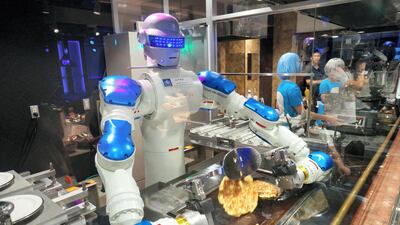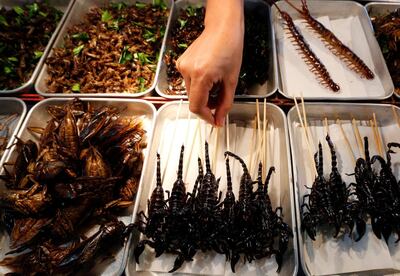Robo-chefs, meatless burgers that bleed, grubs, bugs and 3D-printed dinners may sound like the culinary imaginings of a Ridley Scott film set in the future but, as it transpires, we may well be on the way to cooking, dining and eating in a dramatically different fashion sooner than expected.
By the year 2050, the Earth’s population is set to hit 9 billion, up from our current and already unsustainable 7.7 billion. According to a recent food report released by the United Nations, an estimated 124 million people in 51 countries across the globe are currently facing food crises. The report cites the main causes as conflict and climate shocks, the latter occurring with alarming frequency and intensity.
With the planet’s resources, including water and land for agriculture, swiftly being eaten away, scientists and leading thinkers are coming up with new ways to feed the extra mouths we’re expecting in the next 30 years. Our growing dependency on dwindling resources and industrialised agriculture is what’s contributing to the climate change that’s devastating our food supplies. “More than half of the ice-free land on Earth and more than a quarter of freshwater is used to raise livestock and their food, making animal farming a leading cause of species extinction and global warming,” says a spokesperson from Impossible Foods.
Sustainable solutions
Founded in 2011 by former Stanford biochemistry professor Patrick O Brown, Impossible Foods develops sustainable solutions to the impending global crisis. It is also the group behind the Impossible Burger. Made from water, plant proteins, coconut oil and heme – the molecule attributed to carrying oxygen in our blood – the burger sizzles, smells and cooks just like beef. Brown found that the heme myoglobin is what gives beef its characteristic taste, smell and cooking attributes. It also happens to be extractable from plants such as soy.
Impossible Foods is determined to reduce the number of animals used for food, which would then free up land and water, in turn mitigating climate change. Animal farming is a major contributor to global warming and loss of biodiversity. The explosive growth of animal agriculture and overfishing has played a dominant role in wiping out half the world’s population of wild mammals, birds, reptiles, amphibians and fish in the past 40 years.
The company notes that compared to a patty made from cows, an Impossible Burger uses 20 times less land, a quarter of the water, and produces an eighth of the greenhouse gas emissions. Plant-based "meats", then, are bound to be crucial when it comes to getting our fill of protein in the near future. Another San Francisco start-up, New Wave Foods, does a plant-based shrimp product, and there are also alternatives to fish, cheese and chicken.
However, Dr Stuart Farrimond, food science specialist, author and presenter, cautions against getting too excited or relieved. "Lab-grown meat offers the promise of an ideal solution, but is likely to come up against a lot of opposition. Let's face it, how many people will jump at the chance to eat something grown in a Petri dish?" he says, nodding instead to insect flours as a likely protein alternative to faux meats, which we're already seeing in many products.
Insects as food
Available to buy online, for example, are Cricke crackers made from crickets, which are known for their slightly nutty flavour. The United Kingdom-based start-up also has a tortilla chip product on the way. According to Crické's Francesco Majo, producing a kilo of beef takes about 22,000 litres of water, compared to only 10 litres for the same quantity of farmed crickets. He adds that the best way to convince people to eat insects is to powder them down and present them in a more digestible (read: less insectlike) form.
However, another UK-based group, Eat Grub, is much bolder in its product presentation, leaving a transparent section across its packaging, all the better to see the mealworms, grasshoppers and buffalo worms waiting to be devoured inside. This is not altogether shocking, given that insects already form part of the traditional diet of at least 2 billion people, with 1,900 insect species currently being used as food.
"Insects are not merely 'famine foods' eaten in times of food scarcity, or when purchasing and harvesting conventional foods becomes difficult; many people around the world eat insects out of choice, largely because of the palatability of the insects and their established place in local food cultures," reads the United Nation's Edible Insects – Future Prospects for Food and Feed Security report.
What's in store for the future
If the prospect still sounds less than appetising, rest assured there are other more exciting hypotheses for what’s to come to our kitchens. “Innovation in robotics has a real wow factor,” says Farrimond, referencing the robo-chef that will soon come to the market, complete with two arms for all your kitchen prep – chopping, frying, flipping –plus precision beyond the abilities of us mere mortals.
The food science specialist also promises other technological advancements such as 3D-printed food for "immaculately delicate dishes crafted with textures and appearances that would be impossible to make with human hands". Ultimately, according to Farrimond and LinYee Yan, editor of the magazine Mold: Designing the Future of Food, the next decade will see the developed world shopping for food with an increasing sense of conscientiousness.
“We will transition from being mere consumers to being active participants in creating a new food ecology that is accessible to everyone,” says Yan.
Faux burger with a side of mealworm, anyone?
_________________
Read more:
WATCH: Bareburger brings fake meat that bleeds to the UAE
Vegan ambassador Heather Mills: My kid is never sick
Could eating insects really save the world?
Europe’s rearming plan
- Suspend strict budget rules to allow member countries to step up defence spending
- Create new "instrument" providing €150 billion of loans to member countries for defence investment
- Use the existing EU budget to direct more funds towards defence-related investment
- Engage the bloc's European Investment Bank to drop limits on lending to defence firms
- Create a savings and investments union to help companies access capital
COMPANY%20PROFILE%20
%3Cp%3EName%3A%20DarDoc%3Cbr%3EBased%3A%20Abu%20Dhabi%3Cbr%3EFounders%3A%20Samer%20Masri%2C%20Keswin%20Suresh%3Cbr%3ESector%3A%20HealthTech%3Cbr%3ETotal%20funding%3A%20%24800%2C000%3Cbr%3EInvestors%3A%20Flat6Labs%2C%20angel%20investors%20%2B%20Incubated%20by%20Hub71%2C%20Abu%20Dhabi's%20Department%20of%20Health%3Cbr%3ENumber%20of%20employees%3A%2010%3C%2Fp%3E%0A
F1 The Movie
Starring: Brad Pitt, Damson Idris, Kerry Condon, Javier Bardem
Director: Joseph Kosinski
Rating: 4/5
Honeymoonish
%3Cp%3E%3Cstrong%3EDirector%3A%3C%2Fstrong%3E%20Elie%20El%20Samaan%3C%2Fp%3E%0A%3Cp%3E%3Cstrong%3EStarring%3A%20%3C%2Fstrong%3ENour%20Al%20Ghandour%2C%20Mahmoud%20Boushahri%3C%2Fp%3E%0A%3Cp%3E%3Cstrong%3ERating%3A%3C%2Fstrong%3E%203%2F5%3C%2Fp%3E%0A
The President's Cake
Director: Hasan Hadi
Starring: Baneen Ahmad Nayyef, Waheed Thabet Khreibat, Sajad Mohamad Qasem
Rating: 4/5
Results
6.30pm: Dubai Millennium Stakes Group Three US$200,000 (Turf) 2,000m; Winner: Ghaiyyath, William Buick (jockey), Charlie Appleby (trainer).
7.05pm: Handicap $135,000 (T) 1,600m; Winner: Cliffs Of Capri, Tadhg O’Shea, Jamie Osborne.
7.40pm: UAE Oaks Group Three $250,000 (Dirt) 1,900m; Winner: Down On Da Bayou, Mickael Barzalona, Salem bin Ghadayer.
8.15pm: Zabeel Mile Group Two $250,000 (T) 1,600m; Winner: Zakouski, James Doyle, Charlie Appleby.
8.50pm: Meydan Sprint Group Two $250,000 (T) 1,000m; Winner: Waady, Jim Crowley, Doug Watson.
What is blockchain?
Blockchain is a form of distributed ledger technology, a digital system in which data is recorded across multiple places at the same time. Unlike traditional databases, DLTs have no central administrator or centralised data storage. They are transparent because the data is visible and, because they are automatically replicated and impossible to be tampered with, they are secure.
The main difference between blockchain and other forms of DLT is the way data is stored as ‘blocks’ – new transactions are added to the existing ‘chain’ of past transactions, hence the name ‘blockchain’. It is impossible to delete or modify information on the chain due to the replication of blocks across various locations.
Blockchain is mostly associated with cryptocurrency Bitcoin. Due to the inability to tamper with transactions, advocates say this makes the currency more secure and safer than traditional systems. It is maintained by a network of people referred to as ‘miners’, who receive rewards for solving complex mathematical equations that enable transactions to go through.
However, one of the major problems that has come to light has been the presence of illicit material buried in the Bitcoin blockchain, linking it to the dark web.
Other blockchain platforms can offer things like smart contracts, which are automatically implemented when specific conditions from all interested parties are reached, cutting the time involved and the risk of mistakes. Another use could be storing medical records, as patients can be confident their information cannot be changed. The technology can also be used in supply chains, voting and has the potential to used for storing property records.
Infobox
Western Region Asia Cup Qualifier, Al Amerat, Oman
The two finalists advance to the next stage of qualifying, in Malaysia in August
Results
UAE beat Iran by 10 wickets
Kuwait beat Saudi Arabia by eight wickets
Oman beat Bahrain by nine wickets
Qatar beat Maldives by 106 runs
Monday fixtures
UAE v Kuwait, Iran v Saudi Arabia, Oman v Qatar, Maldives v Bahrain
What can victims do?
Always use only regulated platforms
Stop all transactions and communication on suspicion
Save all evidence (screenshots, chat logs, transaction IDs)
Report to local authorities
Warn others to prevent further harm
Courtesy: Crystal Intelligence
ATP RANKINGS (NOVEMBER 4)
1. Rafael Nadal (ESP) 9,585 pts ( 1)
2. Novak Djokovic (SRB) 8,945 (-1)
3. Roger Federer (SUI) 6,190
4. Daniil Medvedev (RUS) 5,705
5. Dominic Thiem (AUT) 5,025
6. Stefanos Tsitsipas (GRE) 4,000 ( 1)
7. Alexander Zverev (GER) 2,945 (-1)
8. Matteo Berrettini (ITA) 2,670 ( 1)
9. Roberto Bautista (ESP) 2,540 ( 1)
10. Gaël Monfils (FRA) 2,530 ( 3)
11. David Goffin (BEL) 2,335 ( 3)
12. Fabio Fognini (ITA) 2,290
13. Kei Nishikori (JPN) 2,180 (-2)
14. Diego Schwartzman (ARG) 2,125 ( 1)
15. Denis Shapovalov (CAN) 2,050 ( 13)
16. Stan Wawrinka (SUI) 2,000
17. Karen Khachanov (RUS) 1,840 (-9)
18. Alex De Minaur (AUS) 1,775
19. John Isner (USA) 1,770 (-2)
20. Grigor Dimitrov (BUL) 1,747 ( 7)
Sholto Byrnes on Myanmar politics
Sheer grandeur
The Owo building is 14 storeys high, seven of which are below ground, with the 30,000 square feet of amenities located subterranean, including a 16-seat private cinema, seven lounges, a gym, games room, treatment suites and bicycle storage.
A clear distinction between the residences and the Raffles hotel with the amenities operated separately.
Kill%20
%3Cp%3E%3Cstrong%3EDirector%3A%3C%2Fstrong%3E%20Nikhil%20Nagesh%20Bhat%3C%2Fp%3E%0A%3Cp%3E%3Cstrong%3EStarring%3C%2Fstrong%3E%3A%20Lakshya%2C%20Tanya%20Maniktala%2C%20Ashish%20Vidyarthi%2C%20Harsh%20Chhaya%2C%20Raghav%20Juyal%3C%2Fp%3E%0A%3Cp%3E%3Cstrong%3ERating%3A%3C%2Fstrong%3E%204.5%2F5%3Cbr%3E%3C%2Fp%3E%0A
Abdul Jabar Qahraman was meeting supporters in his campaign office in the southern Afghan province of Helmand when a bomb hidden under a sofa exploded on Wednesday.
The blast in the provincial capital Lashkar Gah killed the Afghan election candidate and at least another three people, Interior Minister Wais Ahmad Barmak told reporters. Another three were wounded, while three suspects were detained, he said.
The Taliban – which controls much of Helmand and has vowed to disrupt the October 20 parliamentary elections – claimed responsibility for the attack.
Mr Qahraman was at least the 10th candidate killed so far during the campaign season, and the second from Lashkar Gah this month. Another candidate, Saleh Mohammad Asikzai, was among eight people killed in a suicide attack last week. Most of the slain candidates were murdered in targeted assassinations, including Avtar Singh Khalsa, the first Afghan Sikh to run for the lower house of the parliament.
The same week the Taliban warned candidates to withdraw from the elections. On Wednesday the group issued fresh warnings, calling on educational workers to stop schools from being used as polling centres.
Our family matters legal consultant
Name: Hassan Mohsen Elhais
Position: legal consultant with Al Rowaad Advocates and Legal Consultants.
Avatar: Fire and Ash
Director: James Cameron
Starring: Sam Worthington, Sigourney Weaver, Zoe Saldana
Rating: 4.5/5
The specs: 2019 Aston Martin DBS Superleggera
Price, base: Dh1.2 million
Engine: 5.2-litre twin-turbo V12
Transmission: Eight-speed automatic
Power: 725hp @ 6,500pm
Torque: 900Nm @ 1,800rpm
Fuel economy, combined: 12.3L / 100km (estimate)
Arsenal's pre-season fixtures
Thursday Beat Sydney 2-0 in Sydney
Saturday v Western Sydney Wanderers in Sydney
Wednesday v Bayern Munich in Shanghai
July 22 v Chelsea in Beijing
July 29 v Benfica in London
July 30 v Sevilla in London
More from Rashmee Roshan Lall



